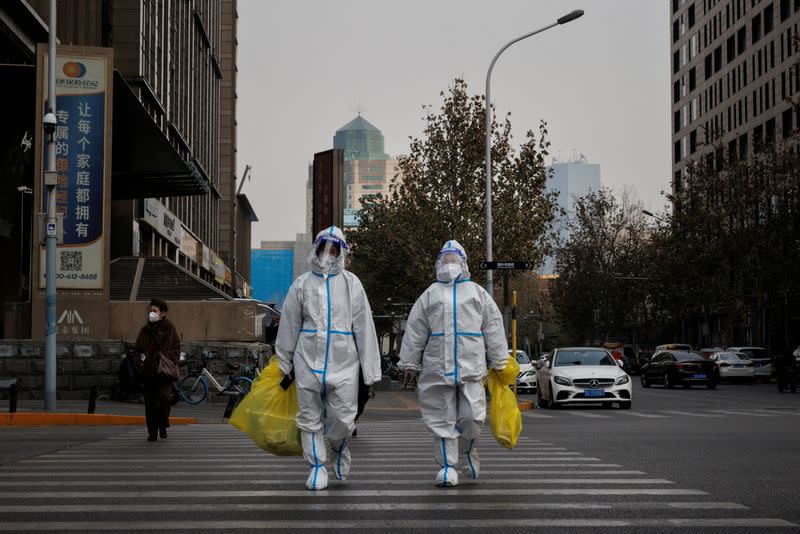Companies in China are scrambling to keep operations going amid a huge surge in Covid-19 infections. Firms have been buying truckloads of medicine, which issuing test kits and encouraging some staff to work from home.
After unprecedented protests against sometimes draconian Covid restrictions, the world’s second-largest economy abruptly dropped its zero-Covid strategy last week – but that appears to have allowed the virus to spread rapidly in some cities.
The fierce spread of the virus has even forced certain businesses to shut their doors for the time being.
There is now talk of many workers and families in cities such as Beijing and Wuhan succumbing to the coronavirus, although official case numbers have fallen to under a fifth of a November 27 peak because China now conducts much less testing.
“More than half of our staff in the mall and the hotel are positive,” a senior executive at a firm that manages one of Beijing’s largest retail complexes said.
The executive, who declined to be identified, said the mall was still open with remaining staff splitting into two teams and only one team working a particular shift.
The split-shift system is also being deployed by other companies, along with Chinese regulators and state-owned banks.
JD.com, which is headquartered in Beijing and employs more than 540,000 people, has sent antigen test kits to its staff and is asking those who are sick to stay home, sources said.
At Sephora China, which has 321 stores across 89 cities on the mainland, each store is handling their staffing issues in accordance with their situation, said a spokesperson for the LVMH brand, adding that all staff testing positive will be given paid leave and can work from home if possible.
ALSO SEE:
‘Severe’ Virus Spread
At another Beijing shopping centre, a gym belonging to the US Powerhouse chain said on Tuesday it would be closed until December 25 to disinfect the premises and to protect the safety of staff and members.
“The spread of the virus is severe and there is a big risk of infection,” the gym said. It had just reopened five days ago after having had to shut for more than two weeks due to district-wide Covid curbs.
“It’s deeply frustrating. Businesses are having to close due to staff being sick, even though they can legally be open,” said Noah Fraser, Beijing-based managing director at the Canada-China Business Council.
“Blame is starting to flow from companies’ (foreign) headquarters to the team on the ground in China, with HQ asking ‘why can’t the China operations navigate these restrictions?’ All other markets have had to adjust and did so successfully,” he said.
Some factories and eateries are retaining Covid curbs, including so-called closed-loop systems that isolate staff from the wider world, until they get a clearer picture of just how workplaces will be affected.
At Volkswagen, which has seen its plants in China heavily disrupted by lockdowns this year, production is currently stable but the automaker has reduced office attendance and is asking staff to stay 1.5 metres apart whenever possible, a spokesperson said.
Chinese electric vehicle maker Nio also said its production was normal, although it is bracing for infections.
“We have sent trucks of medicines and equipment to the factory to be well prepared,” Nio’s president Qin Lihong told a media roundtable on Monday.
National health officials have so far made few comments on workplace conditions, only urging that high-risk areas should be much more narrowly defined, while production or business operations continue elsewhere.
Julian Evans-Pritchard, a senior China economist for Capital Economics, said he believed it will take quite a while for Chinese households to learn to live with the virus and it could take three to six months for consumer activity to return to “something resembling normality.”
“So even if the shift away from zero-Covid will benefit most businesses over the medium-term, it doesn’t provide immediate relief and the next few months will still be very challenging.”
- Reuters with additional editing by Jim Pollard
ALSO SEE:
US Ropes in Japan, Netherlands to Tighten China Chip Curbs
US ‘Desperate’ For Better Ties, Says China on Delegation Visit
US Eases Planned Curbs Against China Chips Over Cost Fears
























